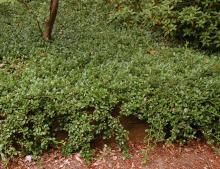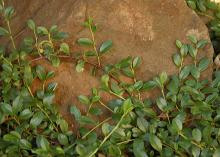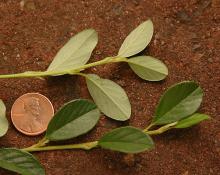Cotoneaster dammeri
Common name:
Bearberry Cotoneaster
Pronunciation:
ko-toe-nee-AS-ter DAM-er-i
Family:
Rosaceae
Genus:
Type:
Broadleaf
Native to (or naturalized in) Oregon:
No
- Evergreen (in mild winter areas, such as western Oregon) or semi-evergreen (in colder climates), prostrate ground cover, 30-45 cm high, slender-creeping branches which root readily when in contact with soil. Leaves alternate, simple, small (2-3 cm long), elliptic to elliptic-oblong, lustrous dark green above but a purplish tinge in late fall and winter; the underside has a waxy bloom and slightly reticulate; petiole 5 mm long. Fruit 6 mm diam., bright red, solitary or occasionally paired.
- Sun to part shade. Adaptable but prefers well-drained soil. An easy cotoneaster to grow. Often used on banks and slopes as a shrub border.
- Hardy to USDA Zone 5 Native to Central China
-
Several selections available, including:
- ‘Coral Beauty’ (‘Pink Beauty, Royal Beauty’) - low growing to 2 ft (0.6 m) high and spreading to 6 ft (1.8 m), glossy green leaves, fairly heavy fruiting, fruit coral red. Possibly more than one selection under this name, Sunset Western Garden Book lists it as growing only to 6 inches (15 cm) high. More recently ‘Coral Beauty’ is considered a selection of the hybrid, Cotoneaster x suecicus (Cotoneaster dammeri x conspicuous).
- ‘Eichholz’ (‘Oakwood’) - low growing to about 1 ft (0.2 m) high, spreading to 8 ft (2.4 m), leaves small (only 12-20 mm long), suggesting that it may be a cross between C. dammeri and C. microphyllus.
- ‘Mooncreeper’ (‘Moon Creeper’) - very low growing, mat forming, dark green foliage.
- ‘Lowfast’ - mat forming, vigorous, to 6-10 inches (15-25 cm) high, glossy dark green leaves, abundant glossy red fruit.
- Oregon State Univ. campus: small garden at the southeast entrance to Ag. & Life Sciences (ALS) south side of Milam Hall (in planter)






